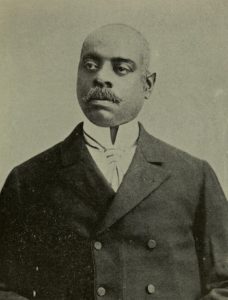
William Chase
*William Chase was born on this date in 1854. He was a Black lawyer and newspaper editor.
William Calvin Chase was born to free Black parents in Washington, D.C. He had five siblings. His Maryland-born father, William H. Chase, an expert blacksmith, was shot and killed in his shop in 1863. Before his father's death, he attended the private school of John F. Cook. Thereafter, young Chase was raised by his Virginia-born mother, Lucinda Seaton.
He was forced to leave school, began to sell newspapers, and became known among many newspaper offices in Washington. At eleven, he was hired to sell hats for Holley & Brother in Methuen, Massachusetts, where he attended more school. He soon moved back to Washington and returned to work as a newsboy. He left public schools, entered the Howard University Model School, "B" class, and then went to Howard University.
A boy during the administration of Abraham Lincoln, he became a lifelong member of the Republican Party. Chase married Arabella McCabe on January 28, 1886, and the couple had a son, William Calvin, Jr., and Beatriz, who eventually worked at the Bee. As a student at Howard, he worked as a clerk in the government printing office. He held that position for two years when he was passed over for a position because he was Black. He left the office and filed charges against the public printer, Almon M. Clapp.
In 1875, Chase became Washington correspondent of the Boston Observer, which went out of business in 1879. Next, Chase worked at the Washington Plain Dealer. Chase desired to gain another political appointment. Frederick Douglass was at that time a United States Marshal and initially desired to have Chase work in his office. Clapp contacted Douglass and asked Douglass to block Chase's appointment instead, which he did. Chase started attacking Douglass in writing, but the pair eventually reconciled and became close friends. Chase then wrote at the Argus and was made editor, and G. W. Graham the paper's business manager. Graham changed its name to the Freelance, but Chase was fired when the paper was sold to a group he had criticized. Finally, in 1882, Chase moved to the Washington Bee.
Within its first year, he became its editor and remained in that role. Chase continued to seek public appointments. In 1881, Douglass was appointed Recorder of Deeds for the District of Columbia, and shortly after, Douglass finally appointed Chase to a clerkship in his office. In this office, Chase wrote a criticism of G. W. Williams, History of the Negro Race, and another criticism of R. Purvis, both of which caused controversies. Soon after taking up editorship of the Bee, Chase attended classes at Howard University Law School in 1883. Continuing his editorial duties, Chase did not take a law degree and maintained his legal studies privately. He was admitted to the bar in Virginia and Washington, D.C., in 1889 and practiced law thereafter in Washington.
His standing as a lawyer and editor made Chase a Republican Party leader in Washington. Chase was named a District of Columbia delegate to the Republican national conventions held in 1900 and 1912. As a 1912 Republican National Convention delegate, Chase helped renominate William Howard Taft as the Republican presidential candidate. His support was unsuccessful, as the Southern-born Democratic candidate Woodrow Wilson was elected. Wilson's entry into the White House marked the extension of the Redeemer policy to Washington, D.C., and the federal government, with the new administration ruthlessly re-segregating Washington offices and other places of life and work.
This harmed Chase's subscriber base, and the newspaper's financial troubles continued and worsened. Chase attempted to respond to these dismal trends by building an editorial alliance with the newly formed National Association for the Advancement of Colored People (NAACP). However, his time as a second-wave American Civil Rights activist was short. On January 3, 1921, Chase died of a heart attack. The editor was found dead in his newspaper office; he had died at his desk. The struggling newspaper survived him by little more than a year.
William Calvin Chase was posthumously honored by memorial resolution 16-187 of the Council of the District of Columbia, adopted on February 7, 2006. The resolution cited Chase's historical significance as one of the first journalistic champions of Frederick Douglass in the Black press and Chase's organization of the movement to achieve the historic preservation of Douglass's later-life home, Cedar Hill.